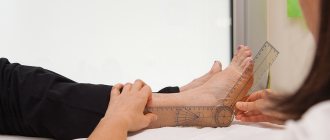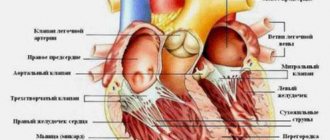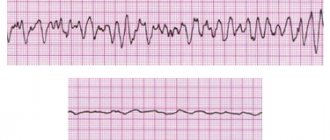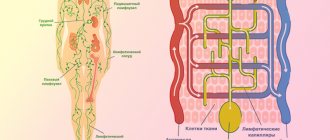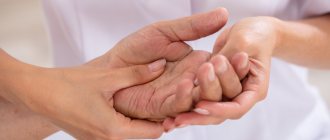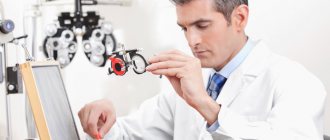Annual statistics clearly demonstrate that heart disease consistently holds a leading position in the list of the most common diseases in Russia. Out of 1000 people, such diagnoses are made to 26 patients.
The prevalence of these pathologies, according to experts, is caused by premature “aging” of heart muscle tissue. Late diagnosis also plays a role. Cardiologists warn: ignoring pain in the heart area is dangerous! If you are worried about pain in the heart area, do not wait until the situation worsens, consult a doctor immediately.
Acute pain in the heart is a symptom of a serious illness that can manifest itself completely unexpectedly and lead to irreparable consequences for the body. That is why it is very important to undergo timely and regular examinations. Now you have a unique opportunity to undergo a free consultation with a specialist and a set of preparatory examinations when enrolling in a course of enhanced external counterpulsation or shock wave therapy of the heart:
Promotion
Just until the end of autumn, undergo a free consultation and a set of preparatory examinations* when registering for a course of enhanced external counterpulsation or shock wave therapy of the heart.**
Send a request
* Check the details of the Promotion by phone. **Has contraindications; consultation with a doctor is required.
Enhanced external counterpulsation (EECP) Cardiac shock wave therapy (SWTS)
Hurry up to apply, the promotion period is limited.
How to recognize heart pain?
Sharp pain in the heart or pronounced discomfort in the chest area are manifestations of angina pectoris. However, not only heart pain manifests itself in this way; there may also be neurological disorders, malfunctions of the respiratory and digestive systems. To a layman, any pain in the chest seems to be a cardiac pathology, but they can be manifestations of osteochondrosis, neuralgia and even pulmonary diseases, such as pleurisy.
How to recognize that it is the heart that hurts? Unfortunately, it is impossible to independently diagnose cardiac pathology; this can only be done by specialists using modern diagnostic equipment. However, it is important to know the main symptoms of heart disease. If you find any of them in yourself, immediately contact a cardiologist:
- the pain does not stop for an hour or more;
- pain occurs even during a night's rest with complete physical rest;
- pain intensity decreases after taking nitroglycerin;
- painful spasms are accompanied by a feeling of suffocation, dizziness, and fainting conditions;
- chest pain begins after intense physical or psychological stress;
- the heartbeat noticeably increases, disruptions in the functioning of the heart are felt;
- the skin acquires an unhealthy pale tint;
- physical weakness and malaise are felt, sweating appears.
Aortic diseases
For heart pain, treatment is not always provided on time; for example, aortic dissection is a case where help often comes too late. The severe pain inherent in this pathological process causes loss of consciousness and painful shock. If immediate help is not provided, the person may die.
Patients are often puzzled: how to get rid of pain in the heart, but in fact, unpleasant sensations are a consequence of other diseases. Among them are the following frequently occurring pathological processes:
- Intercostal neuralgia. It is characterized by acute pain, which intensifies with movement, inhalation, coughing, etc. It can last from 5 minutes to 2-3
days. Localized in the right or left half of the chest in the intercostal space. - Osteochondrosis. The focus of pathology is located in the cervical or thoracic region. The patient's hands become numb and pain radiates to the shoulder blade and neck. Discomfort increases when moving.
- Diseases of the nervous system. Neuroses provoke disruptions in the autonomic part of the nervous system. Patients complain of numerous signs of pathologies, including heart problems. ECG and other studies cannot detect them. People with diseases of the nervous system often experience panic attacks due to an unknown cause of their condition. In such a situation, only a psychotherapist can tell you how to get rid of heart pain while at home. Other doctors will only confirm the absence of other diseases.
- Lung pathologies. Pleurisy and pneumonia often manifest as pain that resembles heart pain. It gets worse with coughing and deep breathing.
- A teenager's heart hurts. In young people, chest pain may occur due to carnitine deficiency. It is a substance responsible for the supply of nutrition to cells. A lack of carnitine occurs due to excessively rapid tissue growth during this period. Pain caused by physical inactivity is no less common. The heart needs regular exercise to become stronger. Without them, any overload manifests itself as discomfort in the chest.
In the case of the listed diseases, you can understand how to relieve heart pain after an examination, which is aimed at determining the cause of the discomfort. Nitroglycerin tablets will be ineffective.
Stitching heart pains
A sudden, sharp stabbing pain in the heart is one of the most striking signs of a heart attack, which often leads to a heart attack. You should urgently call an ambulance if the pain radiates to the left arm, neck, lower jaw and back. However, pain has the same character when:
- pericarditis or inflammation of the heart membrane;
- cardiomyopathy;
- neurosis, the localization of which is near the heart;
- coronary spasm, characterized by impaired circulation of the heart vessels.
When should you see a doctor?
Seeking medical help is an important issue on which a person’s life may depend. It is better not to wait until the pain reaches its peak, but to immediately call an ambulance.
Even if pain does not initially seem like a serious symptom, it is better to be safe than sorry. However, some features of pain may indicate that acute myocardial infarction and other severe pathologies are unlikely.
Signs of a “relatively safe” variant of heart pain:
- the pain is stabbing in nature and lasts several seconds - most likely the cause of the symptom is overexertion or short-term dysfunction of the heart;
- it becomes easier during movements - in case of heart disease, pain intensifies with exertion;
- pain is associated with breathing - in acute heart diseases, shortness of breath may occur, but pain when inhaling, rather, indicates pathologies of the pulmonary system.
You should definitely not delay seeking medical help if:
- acute unbearable pain with a characteristic spread to the left shoulder blade lasting longer than 5 minutes;
- pressing pain in the heart for 30 minutes or longer;
- a sharp increase or decrease in pressure;
- shortness of breath or difficulty breathing;
- loss of consciousness;
- repeated episode of chest pain.
In any of these conditions, you must immediately call an ambulance - the wait can cost not only your health, but even your life.
Acute pain in the heart is an indication to immediately consult a doctor and get a cardiogram, even at a young age. And after 40 years, both women and men should be especially wary of myocardial infarction. In such situations, it is better to be safe than to waste time and not have time to save the heart.
Pressing heart pain
Basically, sensations of this nature indicate the presence of angina. Such pain can radiate to the chin, lower jaw, and shoulder. In this case, there is numbness in the left arm from the shoulder joint to the fingers. The duration of an attack can vary from one hour to several days. Pain occurs both as a result of exertion and in a calm state. Often, patients complain that their heart hurts at night, noting the pressing nature of the pain.
However, a heart attack can be accurately diagnosed only through examination, since myocarditis and mitral valve prolapse, as well as intercostal neuralgia, also manifest themselves.
Dull heartache
Dull pain in the heart area is not only a sign of cardiac pathology. This symptom may indicate problems with the spine and lungs. Its reasons may be:
- manifestations of mitral valve disease;
- some forms of myocarditis;
- symptoms of neurocirculatory dystonia.
Unlike other causes, dull heart pain has one distinctive feature - it is long-lasting and regular.
An attack can be triggered by active work, a stressful situation, hypothermia or overeating.
Palpitations, how to relieve them
Increased or slowed heart rate, as well as extrasystole, do not always indicate the formation of a pathological process. Perhaps there is an acute lack of oxygen for cardiac activity, the person feels panic, excitement, and stress. There may not be an urgent need to correct the functioning of the cardiovascular system with various drugs.
In more severe cases, treatment is prescribed:
- antiarrhythmic drugs;
- β-blockers;
- ARBs (angiotensin receptor blockers);
- surgery for implantation of a pacemaker is indicated.
Pain in the heart area: causes
Heart pain has many causes, the main ones being:
- necrosis of myocardial cells or infarction, pain can be of a different nature;
- an inflammatory process caused by infection, or myocarditis, characterized by aching, pressing, dull pain;
- ischemia and angina pectoris, causing aching, squeezing, pressing pain;
- inflammatory processes in the heart sac, which determine the nature of the pain, such as aching, dull, cutting, pain also occurs on inspiration;
- mitral valve prolapse with aching, pressing pain;
- high blood pressure, giving a feeling of heaviness in the chest;
- hypertrophic processes in the heart muscle with stabbing, aching, pulling, sharp manifestations of pain during exercise;
- myocardial dystrophy, causing aching, sharp, pressing pain.
Diagnostics
To find the cause of aching pain in the heart, a set of diagnostic measures is prescribed. The examination includes:
- collection of anamnesis of life, course of the disease;
- examination of the patient and auscultation of the heart;
- two-week blood pressure monitoring - an unstable blood pressure level will indicate a cardiovascular origin of the pain;
- pulse measurement to diagnose arrhythmia;
- daily monitoring of heart activity according to Holter;
- neurological tests to assess the state of brain function;
- a general blood test will show inflammation and the presence of infection;
- ECG - establishing the nature of the pain: cardiac or extracardiac;
- EchoCG - reveals defects in the structure and functioning of the heart;
- plain radiography of the chest organs (not fluorography!);
- CT or MRI with or without contrast to establish the exact location of the inflammation, if present;
- FGDS - diagnosing a peptic ulcer or gastritis, taking material for a biopsy if an oncological lesion is suspected;
- endoscopy - precise determination of the nature of the gastrointestinal tract pathology;
- X-ray of the stomach with barium - suitable for assessing the condition of the esophagus and other parts of the gastrointestinal tract;
- X-ray diagnostics or MRI of the spine.
In some cases, the scope of examinations may increase, since diseases sometimes occur in an atypical manner. Based on the results of diagnostic procedures, treatment is prescribed.
How to help yourself with heart pain?
During an attack of heart pain, the main thing is not to panic and try to calm down. It is best to take a horizontal position or sit comfortably, leaning on a support. It is worth removing or loosening anything that may make breathing difficult: collar, tie, belt. Be sure to take 1 tablet of nitroglycerin under the tongue. After 15 minutes the pain should subside. If nitroglycerin does not help, do not hesitate, urgently call an ambulance; the patient may have developed a myocardial infarction.
If pain in the heart appears for the first time, do not rush to make a diagnosis yourself; it may not be a manifestation of cardiac pathology at all. It is necessary to take Corvalol or Validol in a dosage of 40 drops and take the most comfortable position, limiting movements and relaxing.
Heart pills prescribed for older people
With age, the body reacts differently to medications, and if previously some tablets helped, then during exacerbation of chronic diseases they may be contraindicated for use. In any case, it is better to consult a doctor and undergo the necessary examination, do an electrocardiogram.
The cardiologist will make an accurate diagnosis and prescribe treatment in accordance with the characteristics of the body and the presence of individual indications. Along with heart medications, medications can be prescribed to prevent atherosclerosis, antithrombosis and strengthen the walls of blood vessels, lowering blood pressure.
For older people, different heart pills may be recommended:
- Adonis-Bromine, Celanide, Digoxin, containing cardiac glycosides with a pronounced cardiotonic effect, for stimulation of the myocardium and correction of arrhythmia.
- Nitroglycerin or Nitrocor, Monosan, Cardiket are used to relieve attacks of angina pectoris and are classified as vasodilators.
- Concor, Biprol, Atenol, Betacard, Korgard and other β-blockers for the prevention of heart attack, with high blood pressure and severe heart contractions.
- Corinfar, Cordaflex, Verapamil or Lekoptin, Veracard and other calcium channel blockers dilate arteries, relax the walls of blood vessels, and act against arterial hypertension.
- Cocarboxylase, ATP, Vitrum Cardio Omega-3, metabolic drugs to improve metabolism.
Many other cardiotonic drugs from the groups included in the Classification of Cardiological Drugs are also prescribed, according to clinical recommendations adopted by the Russian Society of Cardiology. The use of advanced experience and developments of scientists, research and educational institutions in this field of medicine allows us to successfully implement the most effective methods for treating diseases.
